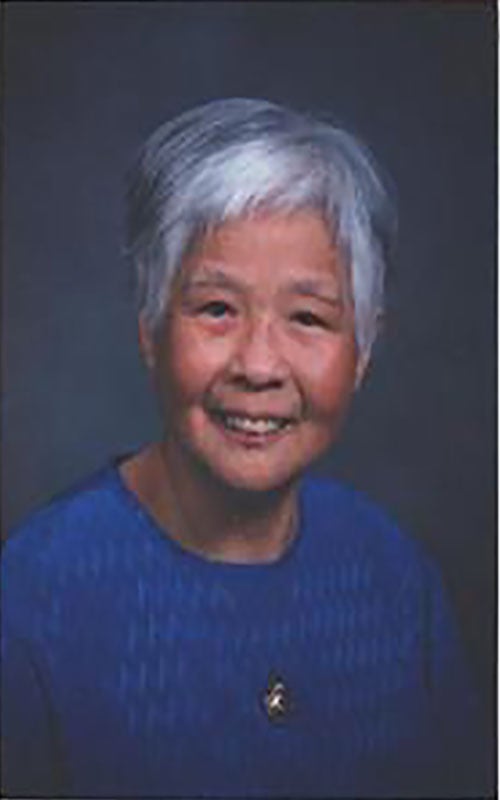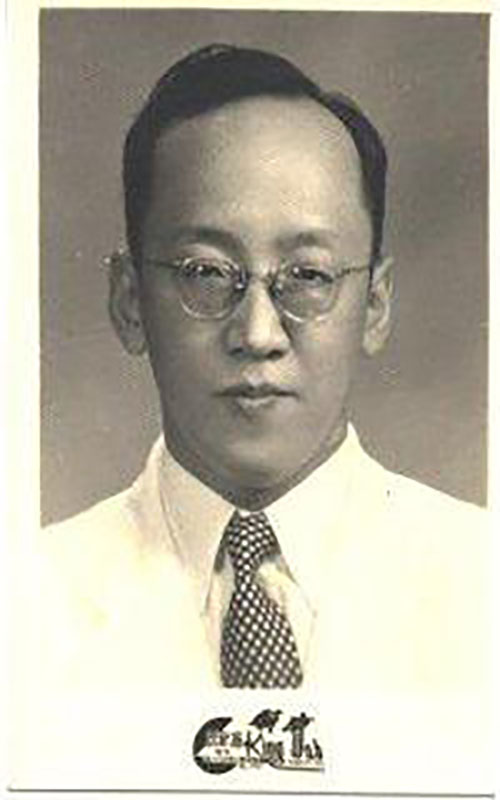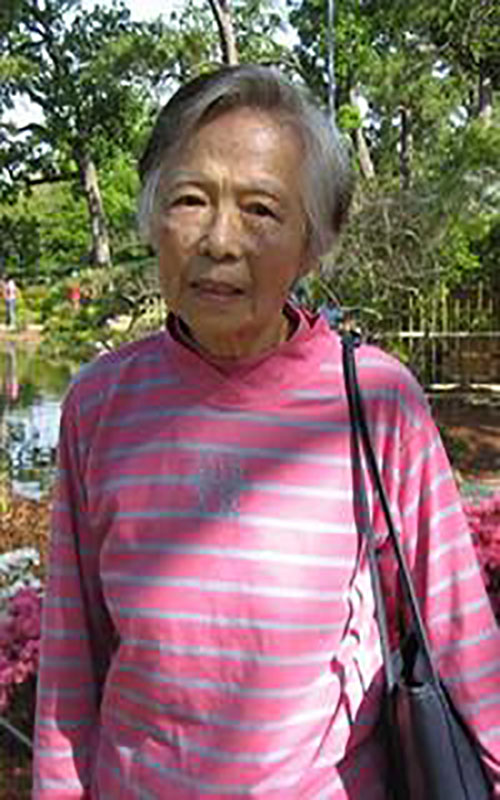Dr. Lee-hsia Hsu Ting Endowed Graduate Fellowship in Information Studies

Dr. Ting was born on February 7, 1923, in Yangchow, China. She attended the National Central University in Chungking and upon graduation, worked as a faculty assistant to help the acting chairman administer the English Department. After Japan surrendered, she went to the United States to study at Mount Holyoke College with a graduate fellowship. She received her MA in 1948 and became an assistant professor of English at the University of Nanking, where she married Nai-tung Ting on November 11.
In 1956 she and her husband immigrated to the United States under the Chinese Refugee Relief Act. In 1965 she received an MLS in library science from the Graduate School of Library Science at The University of Texas. She worked for the Harlingen, Pharr, San Juan, and Alamo public schools as a school librarian and also taught extension courses for the Library School of The University of Texas, as well as summer school of Wisconsin State University – Eau Claire.

Dr. Ting was the first Chinese woman to receive a Ph.D. in library science from the University of Chicago, in 1970. Her doctoral thesis was later published as Government Control of the Press in Modern China, 1900-1949 (Harvard East Asian monograph series 57. Cambridge, Mass.: East Asian Research Center, Harvard University, 1974). She also co-authored with her husband Chinese Folk Narratives; A Bibliographical Guide (San Francisco, Calif.: Chinese Materials Center, 1984). After graduating from the University of Chicago, she taught at the University of Chicago, Northern Illinois University, and Western Illinois University, where she retired in 1993. In 1985, she was a Fulbright scholar and taught at Wuhan University in China.
Dr. Ting was active in her profession. During her tenure as president of the Chinese American Librarians Association (1980-1981), she was instrumental in having a Chinese delegation of librarians attend the American Library Association annual conference. She also contributed to donating books to China through the Books for China Foundation. She died on January 7, 2005.
UT Austin helped Lee-hsia. This endowment will help UT Austin educate more students, who will become future scholars in information studies. The scholarship will help good students who want to study for an advanced degree.

The donor of this endowment, Mrs. Leewen H. Shen, was born in Shanghai in the late 1920s. She was the third of four daughters. Her parents had only one son. Even though in China sons were always treasured by families, especially an only son, Shen’s parents raised, loved, and educated the four daughters equally. Shen’s father was an engineer and an educator. He would tell his children he would not have much money for their dowries and said, “A university education will serve as your dowry; it will enable you to earn a good living and raise a good family.” As a result, even then in the 1940s in China, all of Shen’s siblings graduated from the university.
Leewen’s sister Lee-hsia, in whose memory this endowment was created, was the second daughter. She was five years older than Shen and always looked after her younger sisters and brother. After she immigrated to the U.S. with her husband, she worked in a public school library in South Texas and needed a library science certificate. Over the summers, she studied at The University of Texas at Austin and earned a master’s degree in 1965 in library science (now information studies). The department head, Dr. Douglas, was very good to Lee-hsia. He said she was one of his best students and later asked her to teach a UT library science extension course at Corpus Christi. That was the start of her career in library science.
Leewen H. Shen grew up in China during World War II. After the Japanese invaded China in 1937, her family moved from their hometown of Yangchow (pinyin: Yangzhou) to the inland war capital of Chungking (pinyin: Chongqing). Lee-hsia and her eldest sister attended a boarding high school in a city quite far from the family for the next few years. Being refugees of war, Shen and her brother did not go to school for a couple of years; her father hired a tutor for them. Later, her father sent them to an elementary boarding school on the other side of the city. Shen was 10 years old, her brother was just nine, and they only went home on weekends.
Soon afterward in 1939, the Japanese sent their airplanes to bomb Chungking after the winter fog lifted and sunny spring days came. For days that May, there was continuous heavy bombing day and night; the whole city was on fire. One night after very heavy bombing, the children came out of the shelter and saw the shining bright sky, red from the fires over the mountaintop. Many children were crying. Some parents came to take their children home. Shen and her brother were very anxious and did not know what to do. At 10 o’clock that night, her father’s butler came, woke them, and told them he would take them home. They rode the rickshaw through Chungking and saw the many residual fires. After that, Shen’s mother was afraid to let them return to the school.
Shortly thereafter the central government evacuated the government offices to different towns. Shen’s family moved from the suburbs to a rural area and rented a farmer’s house. Her father worked in a nearby town, in the branch office of the Department of Education as a director of the Public School Textbook Bureau. The bureau wrote, edited, and published textbooks for elementary and high schools in China. The Department of Education’s new middle school for employees’ children was in a separate town from her father’s office and from their home. It did not have a dormitory. Shen’s father arranged for her and her brother to live in a small house (one room plus kitchen) to attend that school. She was 12 years old; her brother was 10. They had to take care of themselves. By necessity, Shen learned to be independent.
Her home and school were in different country towns. They did not have electricity (no radio, no movies, no electric lights) or gas (no heating in winter), or running water. They studied at night by oil lamp and did laundry by hand. A janitor fetched water from a spring to the house and the school. Another janitor had to walk over the mountain to a coal mine to buy and bring back coal for cooking. They went everywhere on foot and joked that they took the number 11 bus — the number formed by their two straight legs. For fun they often wandered around the mountain, hiked with friends after school, and enjoyed nature — the mountains, woods, and creeks. They did not have much but felt healthy and happy.
China was at war and the economy was very tight. Money was also tight for people living on monthly salaries. It was hard to pay tuition for children to have more than elementary education. The government decided that young peoples’ education was very important for the country’s future and established a student loan. The amount that each student owed the government was written on his or her diploma and was to be repaid after the student started to work. Since the war lasted a long time and inflation was drastic, the student loan after a few years meant nothing.
Recognizing this, the Department of Education decided to eliminate the student loan and instead pay room, board, and education for students who escaped from towns in Japanese-occupied territory. Living conditions were very limited. Students had to pass a qualification examination and were sent to schools according to their examination results. Since Shen’s hometown was occupied by the Japanese, she and her brother qualified for this program. The Chinese government paid for her education from high school to university.
Shen moved to Houston with her husband and daughter in 1959 and has lived there ever since. Her husband worked for the Internal Revenue Service. Shen worked in the HISD Curriculum Department until retiring in 1999. Her husband died of cancer in 2002. Her daughter lives close to her now and she is a great help. Although Lee-hsia received her PhD from the University of Chicago, because Shen had lived most of her life in Texas she wanted to benefit a Texas university, a university where Lee-hsia started her library science career.
Lee-hsia was also educated in the wartime. She always was a top student in her class, including at university, where she earned a BA in English literature. She cared very much about her family. After she started to work and before she married, she gave her entire monthly salary to her mother to help the family. All her life, she never spent money on luxuries for herself; she was thrifty and saved her money. After she died, Shen and her brother inherited Lee-hsia’s money. With the money Shen inherited she wanted to do something for her sister. Hence the Dr. Lee-Hsia Hsu Ting Endowed Graduate Fellowship in Information Studies.
How to Give
Learn more at giving.utexas.edu
Search Endowments
Look for inspiring stories
